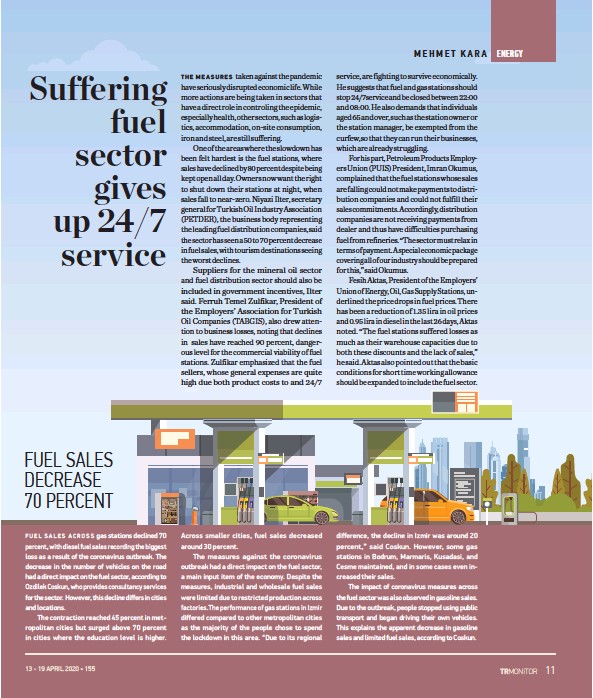The measures taken against the pandemic have seriously disrupted economic life. While more actions are being taken in sectors that have a direct role in controlling the epidemic, especially health, other sectors, such as logistics, accommodation, on-site consumption, iron and steel, are still suffering.
One of the areas where the slowdown has been felt hardest is the fuel stations, where sales have declined by 80 percent despite being kept open all day. Owners now want the right to shut down their stations at night, when sales fall to near-zero. Niyazi Ilter, secretary general for Turkish Oil Industry Association (PETDER), the business body representing the leading fuel distribution companies, said the sector has seen a 50 to 70 percent decrease in fuel sales, with tourism destinations seeing the worst declines.
Suppliers for the mineral oil sector and fuel distribution sector should also be included in government incentives, Ilter said. Ferruh Temel Zulfikar, President of the Employers’ Association for Turkish Oil Companies (TABGIS), also drew attention to business losses, noting that declines in sales have reached 90 percent, dangerous level for the commercial viability of fuel stations.
Zulfikar emphasized that the fuel sellers, whose general expenses are quite high due both product costs to and 24/7 service, are fighting to survive economically. He suggests that fuel and gas stations should stop 24/7service and be closed between 22:00 and 08:00. He also demands that individuals aged 65 and over, such as the station owner or the station manager, be exempted from the curfew,so that they can run their businesses, which are already struggling.
For his part, Petroleum Products Employers Union (PUIS) President, Imran Okumus, complained that the fuel stations whose sales are falling could not make payments to distribution companies and could not fulfill their sales commitments. Accordingly, distribution companies are not receiving payments from dealer and thus have difficulties purchasing fuel from refineries. “The sector must relax in terms of payment. A special economic package covering all of our industry should be prepared for this,” said Okumus.
Fesih Aktas, President of the Employers’ Union of Energy, Oil, Gas Supply Stations, underlined the price drops in fuel prices. There has been a reduction of 1.35 lira in oil prices and 0.95 lira in diesel in the last 26 days, Aktas noted. “The fuel stations suffered losses as much as their warehouse capacities due to both these discounts and the lack of sales,” he said. Aktas also pointed out that the basic conditions for short time working allowance should be expanded to include the fuel sector.

FUEL SALES DECREASE 70 PERCENT
Fuel sales across gas stations declined 70 percent, with diesel fuel sales recording the biggest loss as a result of the coronavirus outbreak. The decrease in the number of vehicles on the road had a direct impact on the fuel sector, according to Ozdilek Coskun, who provides consultancy services for the sector. However, this decline differs in cities and locations.
The contraction reached 45 percent in metropolitan cities but surged above 70 percent in cities where the education level is higher. Across smaller cities, fuel sales decreased around 30 percent.
The measures against the coronavirus outbreak had a direct impact on the fuel sector, a main input item of the economy. Despite the measures, industrial and wholesale fuel sales were limited due to restricted production across factories.
The performance of gas stations in Izmir differed compared to other metropolitan cities as the majority of the people chose to spend the lockdown in this area. “Due to its regional difference, the decline in Izmir was around 20 percent,” said Coskun. However, some gas stations in Bodrum, Marmaris, Kusadasi, and Cesme maintained, and in some cases even increased their sales.
The impact of coronavirus measures across the fuel sector was also observed in gasoline sales. Due to the outbreak, people stopped using public transport and began driving their own vehicles. This explains the apparent decrease in gasoline sales and limited fuel sales, according to Coskun.










